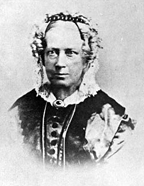Carpenter, Mary

Carpenter, Mary (1807-1877) a liberal reformer, was the eldest child of Anna Penn and the Revd Lant Carpenter, one of the leading Unitarian educationists of his day. True to their principles, her parents secured for Mary the excellent progressive classical and scientific education of her father's school, an unusual education for a girl or even many boys in that period. Mary became principal teacher in the girls' school run by her mother and sisters. Inspired both by her father's teachings and by other Unitarian reformers, however, she increasingly devoted herself to the education of the poor. Long a Sunday school teacher at her father's chapel at Lewins' Mead in Bristol, she established a ragged school which became a model of its kind. Her subsequent work in introducing reformatory and industrial schools of a new kind into England, influencing greatly educational ventures for the poorest and those on the margins of society, made her one of the most well-known women of her day in liberal reforming networks. She was invited to speak to a parliamentary committee, an extraordinary feat for a woman in 1852.
In the last decade of her life, from 1866-77, Mary Carpenter turned to ardent espousal of the cause of educational reform in India. This stemmed from 1832 when Raja rammohun roy met her father during his visit to Bristol. Imbued with liberal, anti-racist attitudes, Mary Carpenter was stimulated by visiting Bengalis in the 1860s to write a memoir of the Raja’s last days and to visit India herself. Motivated both by gender interests and concerns for prison reform, she was welcomed by Indian religious, social and educational reformers such as the Tagore family on her ensuing four visits to India. In England she eagerly publicised her experiences, striving to achieve her interpretation of what Indian reformers desired.
Carpenter's eloquent addresses to packed audiences at the National Association for Social Science and her acclaimed Six Months in India, published in 1868, made Mary Carpenter a celebrity. Practically, however, she achieved little. She helped secure some government aid for female normal (ie teacher training) schools in three Indian cities and, on a later visit to India, the establishment of girls' schools in Bombay and Ahmedabad. Appalled at the treatment of both adult and juvenile criminals in India she influenced some legislative reform. She also helped stimulate the founding of branches of the Indian National Association and, at keshab chandra sen's wish, she established the National Indian Association in England in 1870.
It is debatable how far Mary Carpenter actually could understand the Indian situation or how far as an Englishwoman her liberalism was touched by cultural imperialism and class attitudes. She did become aware of the wide variety of beliefs and attitudes in the vast subcontinent and was sensitive to Indian reformers' dread of 'denationalisation' through conversion to Christianity and westernisation. Thus she detached herself from any missionary work, believing strongly that such efforts were anathema to many Indians. She was, however, closely connected with well-educated Brahmin reformers of the brahma samaj and other associations following it such as the Veda Samaj. Both their theistic religious beliefs and their social and political aspirations were akin to those from the Unitarians in England from which Mary Carpenter came, but were not necessarily in tune with other Indian reformers or nationalists. She wholeheartedly supported their advanced position on women's rights, her own ideas on these being substantially developed through her Indian experiences, but the breaking of customary gender mores at some of the functions she attended, greatly upset other Indians. Because of language constraints she was able only to converse with male reformers for the most part and she had little contact with Indian Muslims or many of the poor, although she enthusiastically urged for their education and for a progressive one at that.
Mary Carpenter's greatest contribution to Indian reform was probably her securing of the training of Indian women, including widows and Eurasians, as teachers. Although her absolute commitment to the causes she espoused exhausted even some of her supporters, her thin, frail indomitable figure and passionate eloquence based on detailed research and clear logic, won her warm praise from reformers in two closely connected but very different countries. [Ruth Watts]
Bibliography Mary Carpenter, Memoir of Joseph Tuckerman, DD of Boston (US), London, 1849, Mary Carpenter, The Last Days in England of the Rajah Rammohun Roy, London, 1866, Joseph Estlin Carpenter, The Life and Work of Mary Carpenter, London, 1879, Antoinette Burton, The White Woman's Burden, British Feminists and The Indian Woman, 1865-1915; Western Women and Imperialism, Women's Studies International Forum, XIII-4, 1990.
